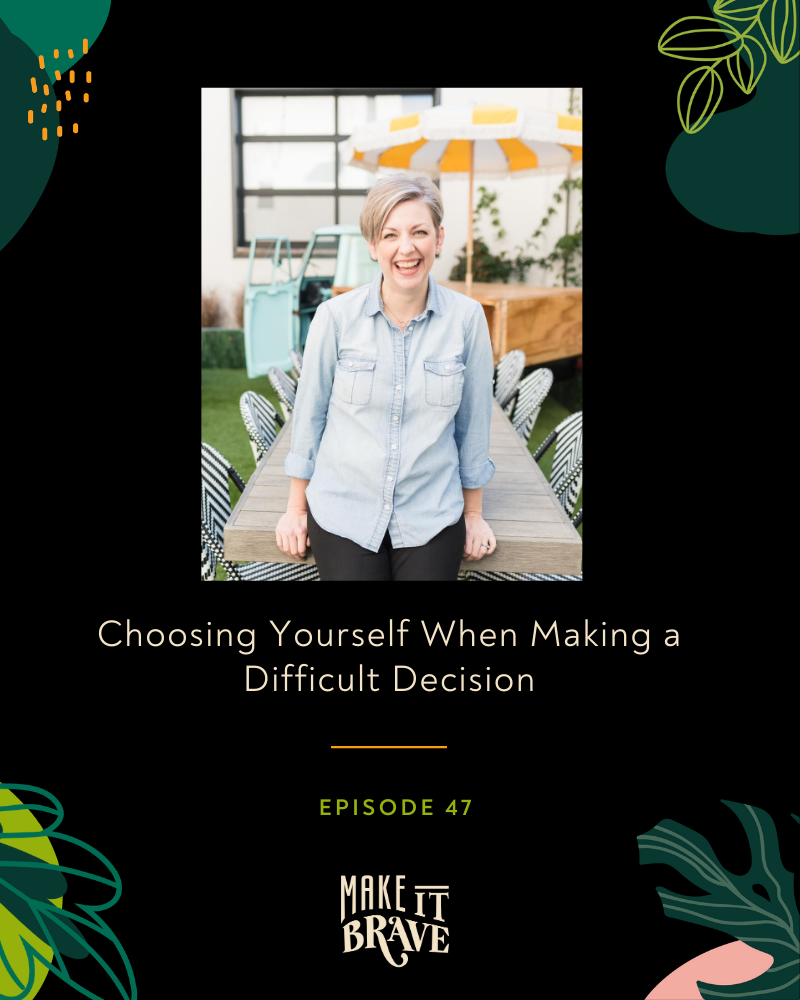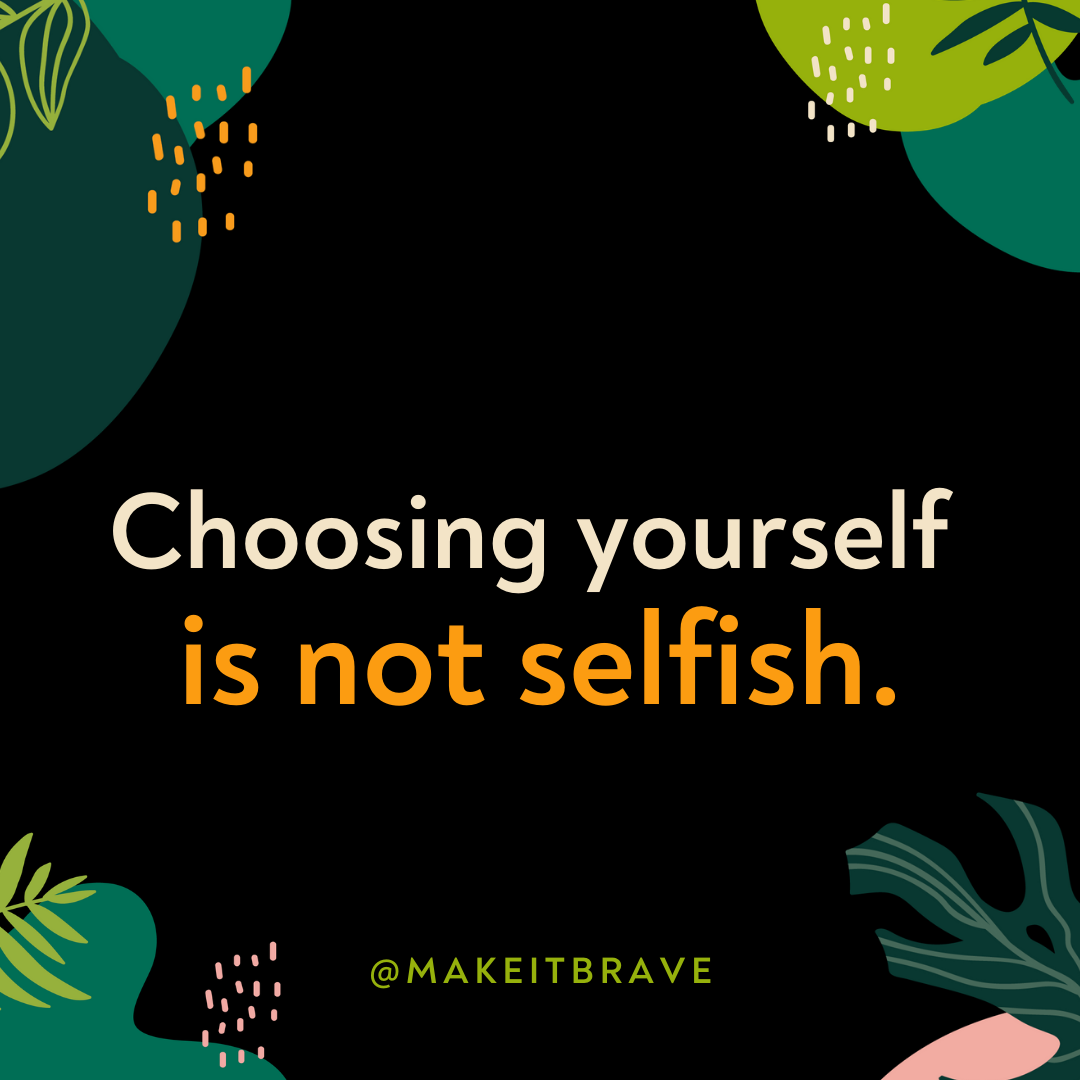Choosing Yourself When Making a Difficult Decision

Lately, it seems so many people I know are facing incredibly difficult decisions.
Many parents I know are facing tough choices around childcare, schooling and work. Do you send your child to school? Do you send them virtually? Do you homeschool? Do you quit your job? Do you do both?
Then, there are difficult decisions about what feels safe. Do you go on that trip? Do you see your friends? Do you attend that gathering or event?
And even if your challenges aren’t related to the pandemic, chances are good that perhaps simple decisions seem a whole lot harder because we are operating under a heightened level of stress.
I know that has absolutely been true for me.
Facing a Difficult Decision
Last week, I was extremely anxious about making a decision that deep down in my gut I knew was the right one. In fact, I’ve faced multiple decisions lately like that.
But this particular decision was around my work. And it involved telling someone “no.”
I was being asked to take on a new project for a client. While it was certainly something I “could” do, I really began to question whether it was something I “should” do.
Part of the reason I was questioning this project is because it was really outside of my sweet spot and genius zone. And, it was going to take a considerable amount of time and resources to pull together.
But there was something else nagging at me too. Every time I thought about this project, I was filled with dread. It was not something I really wanted to do. I realized that was not a good sign.
However, on the flip side, I know that work isn’t always fun and games, right? Sometimes we have to do work we don’t like––especially as a business owner.
But, as I listened to my gut, I realized it was more than that. It was not that this project was outside of my comfort zone or that it would not be fun for me (even though both were true). The reason I dreaded it was because I realized the cost of doing it was too high.
Our Decisions Have a Cost
You see, every time we say “yes” to something, we often have to say “no” to something else.
In this case, I realized that saying “yes” would mean sacrificing some of the other projects and initiatives I’m working on, including Make it Brave. It would force me to spend a considerable amount of time and energy on something that would drain me instead of filling me up.
And for me, at a time when we’re dealing with limited childcare due to the pandemic, I have limited time for work. I’m realizing more and more that I have to be really choosy about what I want to take on right now. If I say “yes” to a project I don’t really want to do, that also means I don’t have time to take on something else that I actually DO want to pursue.
Ultimately, I realized that if I were to say “yes” to this project, I would be saying “no” to me. And while it felt good to recognize that, it was incredibly hard for me to do. I was very nervous to tell the client “no.”
Why I Struggle with Saying No
Saying “no” is something that I’ve always struggled with doing. And much like the other times I’ve encountered these scenarios, I found myself falling into the same old traps.
So, why did I struggle with saying “no”? Here are a few reasons. And if you’ve struggled with saying “no”, maybe these will sound familiar:
- I worried about what they would think.
- I worried about how to say it without hurting their feelings.
- I worried that if I said “no” to this that they might take it personally.
- I worried they might think I don’t want to work with them at all.
- And ultimately, I didn’t want to disappoint them.
As a recovering people-pleaser, choosing myself feels selfish. Saying “no” feels counterintuitive to being in the client services world.
And yet, I realized that if I don’t choose myself, what is that saying to other people? How am I expecting others to treat me?
How can I expect to show up in my power and brilliance if I’m constantly saying “yes” to things that aren’t in my strengths zone?
How can I have healthy boundaries if I don’t learn to say “no”?
What Happens When We Don’t Choose Ourselves
I’ve also begun to see that when I don’t choose myself, it says that I’m not confident. That other people’s needs are more important than my own. It says that my time isn’t valuable and I’m willing to give it away to anyone and everyone.
After all, how can I expect others to treat my time, my energy and my work with respect if I’m not respecting myself?
The reality is that when we put others’ needs above our own, we’re saying our needs don’t matter. And the relationship becomes incredibly one-sided. I have found myself in this situation before and it’s not fun. All of that giving gets tiresome and you eventually become resentful.
And I don’t want that. I want to give, serve and help when I feel energized to do so, not because I feel obligated or forced into it.
This is still a lesson I’m learning, but when we choose ourselves, we are saying that our needs have value too.
As the saying goes, you can’t pour out from an empty cup. And if we keep serving other people to our own detriment, we’ll leave ourselves high and dry. Our cups will be empty. Not only will we feel depleted, but we will also have less to give others.
Choosing Yourself in Decision Making
So, how do we choose ourselves in the midst of difficult decisions?
Here’s the framework that helped me as I worked my way through saying “no” in this case.
I asked myself three questions:
1. How will this serve me right now?
I started by asking myself whether taking on this project would serve me. To be honest, this question made me feel so selfish. But I wanted to make sure I was crystal clear about what the benefit would be to doing this work.
And for me, the answer was strictly financial. Saying “yes” would mean more revenue for my business. But that was it. There wasn’t anything else that this particular project would do to serve me personally or professionally.
It wouldn’t be enjoyable, fulfilling or even something I wanted to add to my portfolio. Saying “yes” was honestly more about serving the client and trying to make them happy than it was about serving me. And if I was only serving them out of obligation, would I really be serving them well? Would I be serving them well if I’m operating outside of my strengths?
Not really.
Which brings me to the next question…
2. What will this cost me?
If I were to just answer that first question, it might be easy to say “yes” to the project. After all, a financial benefit sounds like a good one, right?
But, in this case, there were a lot of costs to saying “yes.”
This project would have cost me a ton of time, especially because it’s not in my zone of genius. And because of that, it would drain my energy because it wouldn’t be something that fills me up.
It would have also taken me away from other projects––not only the ones I have lined up, but other opportunities that might come my way. Taking this one would have made my plate so full that it likely would have impacted my ability to say “yes” to other opportunities that might be a better fit for my skills and strengths.
Which brings me to the final question….
3. Is the cost worth it?
When I looked at all the things that saying “yes” would have cost me, I realized that “no” was the only answer.
Even though it’s difficult to turn away revenue as a business owner, I realized that the cost of saying “yes” was too high at this particular time in my life.
At a different time or in a different scenario, perhaps the answer would have been different. But as I grow as a person and as a business owner, I’m realizing that financial gain is not worth sacrificing my mental health and well being––especially during this pandemic.
After all, how can I serve my clients well if I’m completely drained and worn out? How can I show up well for my family if I’m working nonstop? And how can I pursue my creative goals and dreams if my well is dry?
The Cost of Our Decisions
While this series of questions feels awfully similar to developing a simple pros and cons list, I found that framing the decision-making process this way helped me see there is a cost to the choices I make. In some ways, this feels like a cost-benefit analysis, but without the hard numbers.
But perhaps, more importantly, this approach is framed in a way that places the benefit on how it will serve or benefit ME.
Oftentimes, when we think of benefits, we think about how it will help others. Or, how we will be perceived. We want to do what we think we “should” do. We want to be good people and do the right thing.
But, when we take action out of obligation, we are leaving ourselves miserable in the process.
When we flip the script and focus on how the decision benefits or serves us personally, we are making a conscious effort to prioritize self-care and our own wellbeing.
I’ll admit, as a farmer’s daughter, this concept is still VERY hard for me to grasp. I was brought up by a long line of people who put everyone else first. To put it bluntly, I come by my martyrdom honestly.
So, thinking about decisions in this way feels very selfish to me. But, sacrificing your time, your energy and quite frankly, your joy for other people does not make you better. In fact, it often makes you bitter.
Choosing yourself is not selfish.
Considering how your actions will benefit you is not selfish.
It means you are taking care of yourself and how you choose to spend your time. Because when you take care of yourself, you are able to show up more fully and generously for others.

Who Are You Saying Yes For?
I also think this framework helps you see whether you are doing something to win the approval of others or if you are doing it because it is something that is fulfilling and beneficial for you.
After all, don’t you want to do things that bring you joy? Don’t you want to serve and give and show up out of abundance instead of obligation?
I know I do.
And in order to do that, I’ve got to start getting comfortable with saying “no” to things that don’t serve me and start saying “yes” to more things that do.
Entrepreneur and Author Derek Sivers says, “If it’s not a hell yeah, it’s a no.” In other words, If we can’t say “yes” with enthusiasm, perhaps it’s not something we should say “yes” to at all.
And perhaps that’s another great way to look at decision making, especially right now during the pandemic. Especially, as self-care is more important than ever.
A lot of this comes down to listening to your gut, or as Glennon Doyle calls it, “your inner knowing.” We all have intuition for a reason.
Your heart, your gut, your intuition, your knowing is trying to tell you something.
It’s time to start listening.
It’s time to start choosing yourself.

Wow!! Thank you for this!! Although this pertained to your job and projects, this absolutely helped me in a decision that I’ve been struggling with for months in relationships: thank you!
I’m so glad you found this framework helpful, Jessica! That’s great!